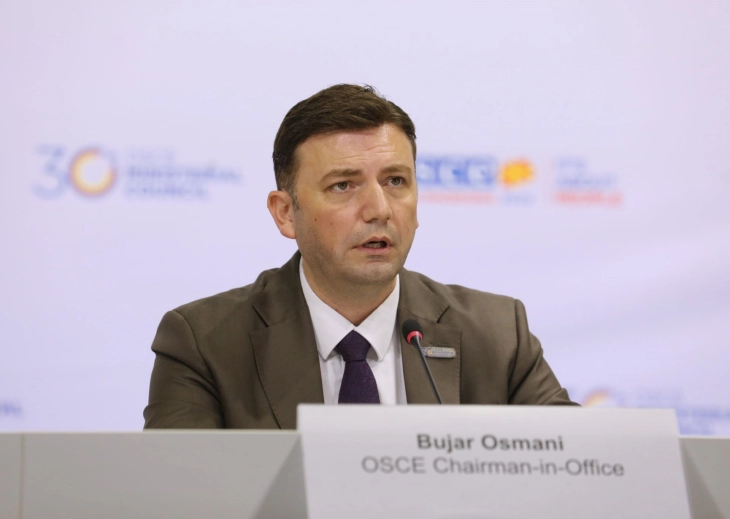Osmani: Russia, not Western democracies, is cause of problems and instability in the region
- The Russian Federation is the cause of the problems and instability in the region, and the only solution for all the challenges in this region is membership in the EU and NATO. I want to emphasize that this is not my subjective perspective, and I can support it with numbers and facts, Foreign Minister and OSCE Chairperson-in-Office Bujar Osmani said commenting on the statement of his Russian counterpart Sergey Lavrov that Western democracies are to blame for all tensions in the Balkans.

Skopje, 1 December 2023 (MIA) - The Russian Federation is the cause of the problems and instability in the region, and the only solution for all the challenges in this region is membership in the EU and NATO. I want to emphasize that this is not my subjective perspective, and I can support it with numbers and facts, Foreign Minister and OSCE Chairperson-in-Office Bujar Osmani said commenting on the statement of his Russian counterpart Sergey Lavrov that Western democracies are to blame for all tensions in the Balkans.
“North Macedonia is a unique story, a functional, multiethnic democracy in a challenging region known for conflicts and intolerance. We created a different narrative that today becomes a reference, a model, and I can absolutely say that behind that success, the United States stands. Without their support, the previous Republic of North Macedonia would not be what it is today, and I am convinced of that,” Osmani said.
According to him, this also applies to the region where the US and the EU are said to be the only factors enabling the easing of tensions and democratic reforms.
“On the contrary, I believe that the Russian Federation, through both subtle and overt steps using its proxy actors in the region, consistently destabilizes it. It attempted to destabilize Montenegro during its NATO membership process, tried to undermine our NATO membership referendum in 2018, and disrupts processes in Bosnia and Herzegovina, Serbia, and through Serbia, in Kosovo,” Osmani said during the final press conference of the OSCE Ministerial Council.
Regarding when he expects the dialogue for a peaceful resolution of the conflict in Ukraine to start, Osmani pointed out that, according to international law, the borders of every sovereign state are inviolable. Russia has violated the basic principles of this right, and until we return to respecting that right, the Russian Federation should not invoke it.
He also commented on the debate within the OSCE on whether Russia's membership in the organization should be suspended as a consequence of violating its fundamental principles and commitments. He mentioned that there are two arguments against taking such action.
“The first is legal, and the second is political. The first is the example of Yugoslavia in 1992 when the country was excluded from membership by a consensus-minus-one decision due to massive human rights violations. However, this rule wouldn't be meaningful today when there are different opinions within the organization. Here, he expanded on the political argument, mentioning that some member countries see the OSCE as established for dialogue among ideologically diverse states. The OSCE is not and has never been an organization of like-minded countries, and its goal is to engage all these countries with different opinions in cooperation to ensure peace and stability in the region,” Osmani said.
He added that the Russian Foreign Minister Sergey Lavrov did not arrive in the country, and he was not received by him at the national level but at the level at which he stayed in New York to participate in the UN General Assembly.
In relation to the situation in Gaza, Osmani said that Gaza is not within the mandate of the OSCE. However, he reiterated the country's condemnation of the attacks on Israeli civilians on October 7 and expressed support for continuing the ceasefire and political dialogue between the two sides, endorsing the "two-state solution."







